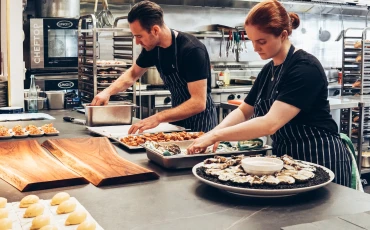Find what you need
Course Details
- Duration78 Weeks
- Fees$6000 AUD (6 months) AUD
- CertificateYes
- LanguageEnglish
- Description
- Curriculum
- Training & Other Facilities
- Duration & Delivery
This qualification reflects the role of highly skilled senior operators who use a broad range of hospitality skills combined with managerial skills and sound knowledge of industry to coordinate hospitality operations. They operate independently, have responsibility for others and make a range of operational business decisions.
This qualification provides a pathway to work in any hospitality industry sector as a departmental or small business manager. The diversity of employers includes restaurants, hotels, motels, catering operations, clubs, pubs, cafés, and coffee shops. This qualification allows for multiskilling and for acquiring targeted skills in accommodation services, cookery, food and beverage and gaming.
The skills in this qualification must be applied in accordance with Commonwealth and State/Territory legislation, Australian standards and industry codes of practice.
- Aspire to excel in leadership roles within the hospitality industry.
- Are passionate about managing and coordinating hospitality operations.
- Seek a pathway to a career as a hospitality manager in various settings such as hotels, restaurants, cafes, and more.
- Desire to acquire a deep understanding of both practical hospitality skills and managerial expertise.
- Want to expand their career prospects and professional opportunities in the field of hospitality management.
There are no specific prerequisites specified in the training package for this qualification.
RTO Requirements for International Students
To be eligible for enrolment at Norton Institute into the SIT50422 Diploma of Hospitality Management all international applicants must be 18 years old or older and exhibit evidence of academic and English language proficiency as follows:
Academic Requirements:
✅ Successful completion of Year 12 or equivalent.
English Language Requirements:
✅ Be competent in written and spoken English with an IELTS Score of no less than 6.0 or equivalent language test score.
After completing all of the required units of this course, you will be awarded a nationally recognised qualification in SIT50422 Diploma of Hospitality Management. Students who do not complete all required units may be eligible for a Statement of Attainment in partial completion of a SIT50422 Diploma of Hospitality Management.
- Online + Face to face (blended)
Advanced Diploma of Hospitality Management
Bachelor of Hospitality Management
Specialized short courses in areas such as Event Management or Revenue Management
Professional certifications in Food Safety and Hygiene
The SIT50422 Diploma of Hospitality Management comprises a total of 28 units of competency as outlined below:
11 core units
17 electives units
Core Units
Elective Units
This Diploma of Hospitality Management qualification opens doors to a wide array of exciting career opportunities in the dynamic hospitality industry, including roles like:
- Banquet or Function Manager
- Bar Manager
- Café Manager
- Chef de Cuisine
- Chef Patissier
- Club Manager
- Executive Housekeeper
- Front Office Manager
- Gaming Manager
- Kitchen Manager
- Motel Manager
- Restaurant Manager
- Sous Chef
- Unit Manager Catering Operations
One of the unique aspects of the Diploma of Hospitality Management qualification is that, at the time of publication, no specific occupational licensing, certification, or legislative requirements apply. This means you can enter these roles with confidence, ready to embark on a fulfilling career in hospitality management.
*In accordance with statistics sourced from the Australian Government Department of Education and Training and the National Centre for Vocational Education Research.
The Norton Institute is well-equipped with all necessary amenities, such as a state-of-the-art computer lab with internet access and essential IT software, a data projector, a resource borrowing service, printing and photocopying facilities, and a designated student common area.
The Diploma of Hospitality Management course spans over 78 weeks across six terms and follows a blended delivery mode, which combines classroom, practical, and online learning.
Classroom Learning: The instructor will introduce each unit and provide in-depth knowledge through various teaching methods during the classroom sessions. The course materials are comprehensive, and the trainer will guide students through interactive learning activities and digital challenge tests available on SIC eSpace online. Structured Online Learning: In addition to the 20 scheduled contact hours, an extra 4 hours per week are allocated for structured online learning. This time is for students to revise, practice, and reinforce what they have learned in the classroom and practical sessions. The online learning platform is organized according to units and topics, making it easy for students to explore and progress through the course at their own pace based on their understanding and confidence in the subject matter. Some learners may move through the material more quickly, while others may take more time, depending on their individual comfort level with the topics. Revised Sample Timetable: Day-to-day face-to-face/practical (20 hours/week) Thursday 8 a.m. – 4 p.m. Friday Lectures, group work, oral work, case studies, practical kitchen Saturday 8 a.m. – 1.30 p.m. Lectures, group work, oral work, case studies, practical kitchen
Course Details
- Duration78 Weeks
- Fees$6000 AUD (6 months)
- CertificateYes
- LanguageEnglish
- Online Application Enrol Now
FAQs
-A Diploma of Hospitality Management provides specialized education, leading to better job prospects in the hospitality industry, including management roles, and offers practical experience through internships.
-The qualifications needed for a career in hospitality can vary depending on the specific job or role, but typically, a high school diploma or equivalent is the minimum requirement for entry-level positions. However, for more advanced or specialized roles, a degree or diploma in hospitality management or a related field can be advantageous. Additionally, many jobs in the hospitality industry place a strong emphasis on customer service skills and experience, making interpersonal and communication skills highly valuable. Specific requirements can differ by employer and job type, so it's essential to review job listings and employer expectations for precise qualifications.
-A Diploma in Hospitality Management can lead to careers as Hotel Managers, Restaurant Managers, Event Coordinators, and more. These roles involve managing customer service, staff, and event planning in various hospitality establishments, providing versatile career opportunities in the industry.




